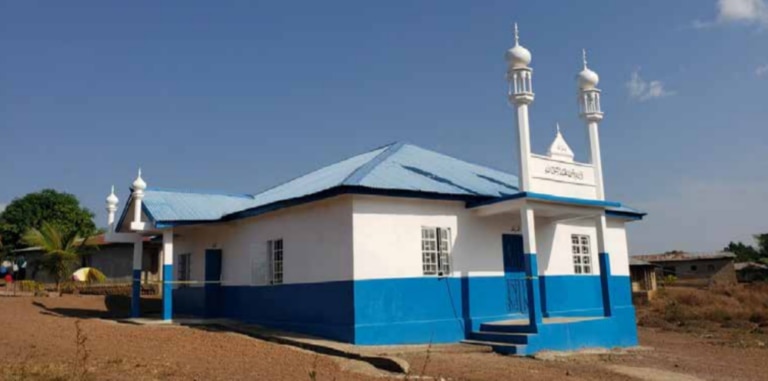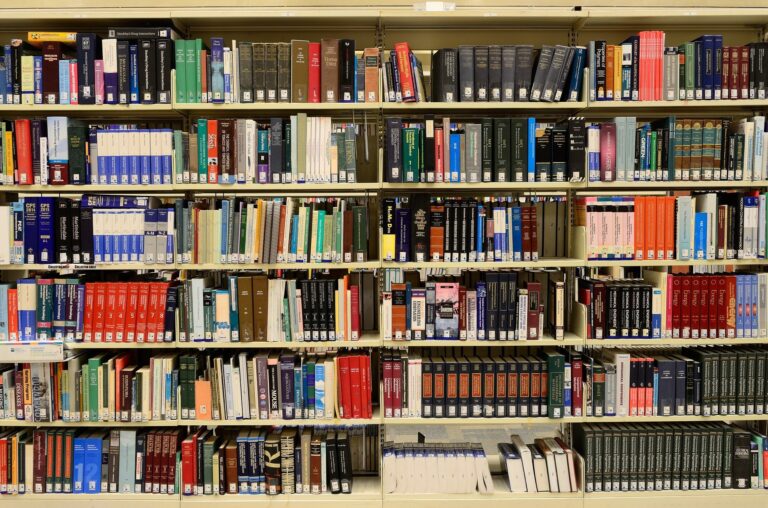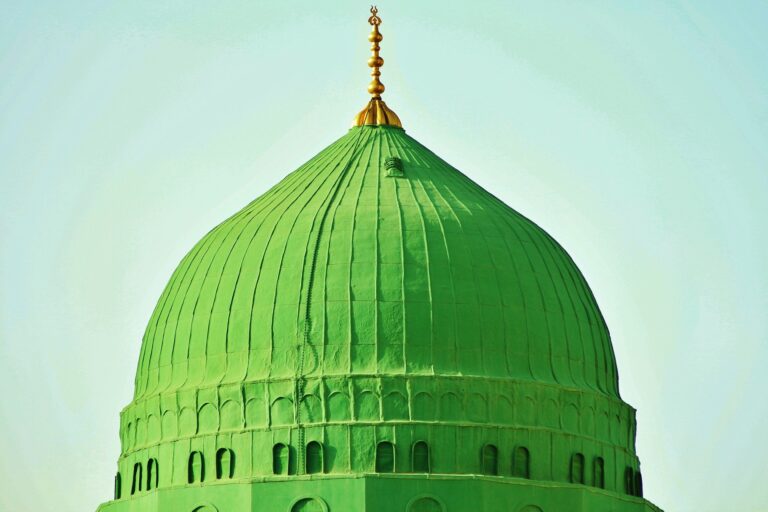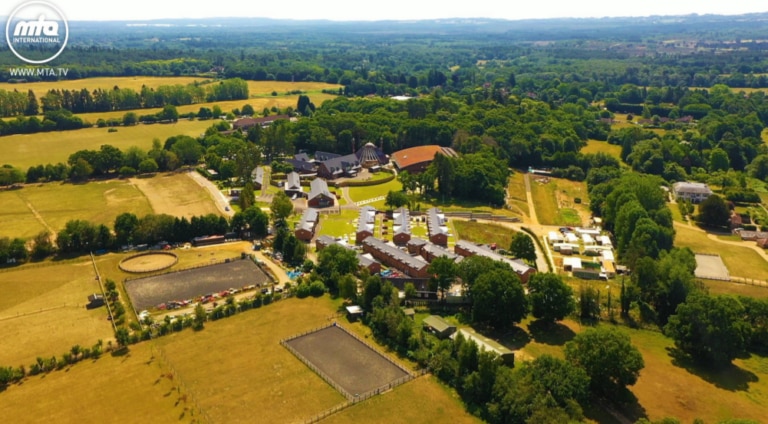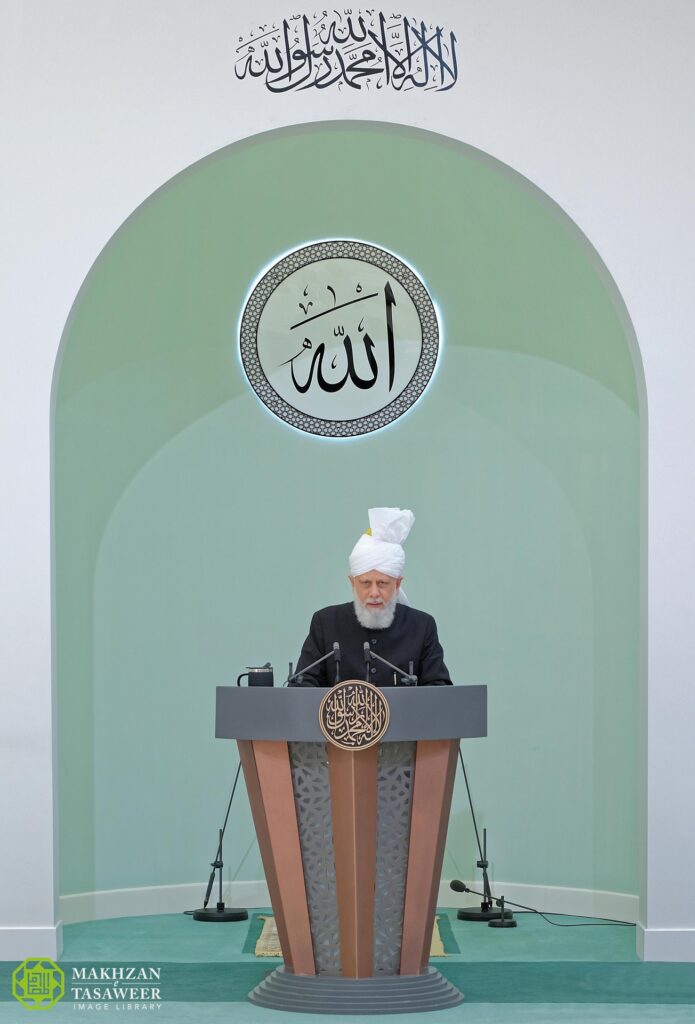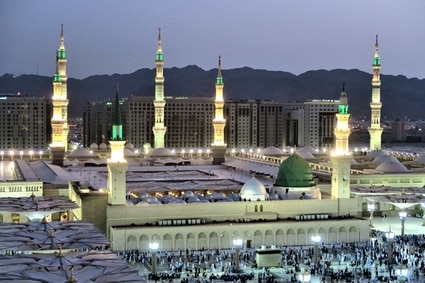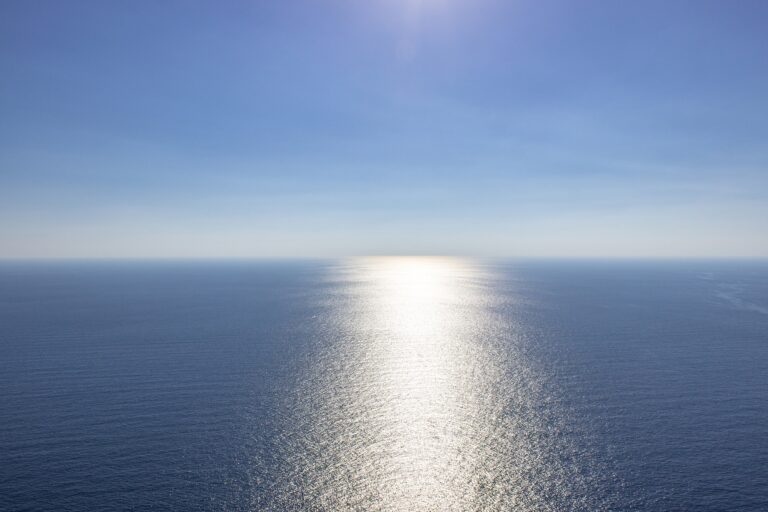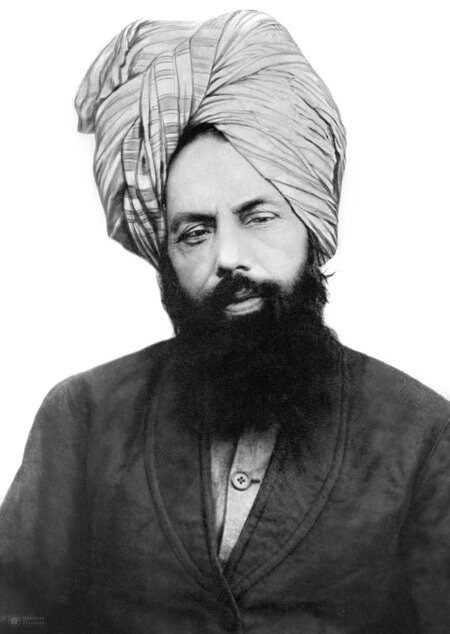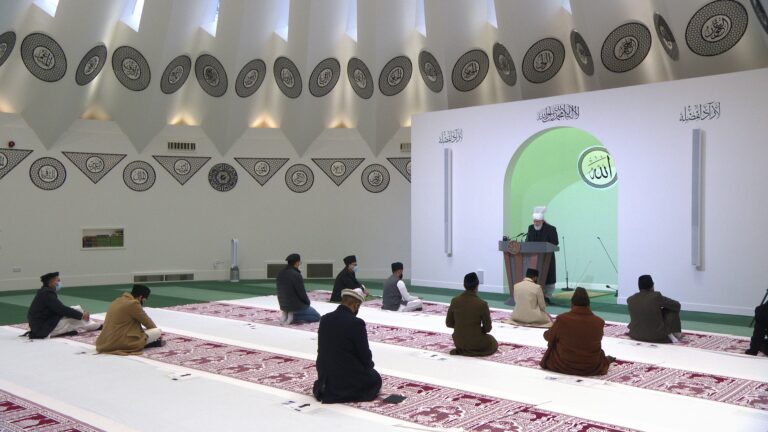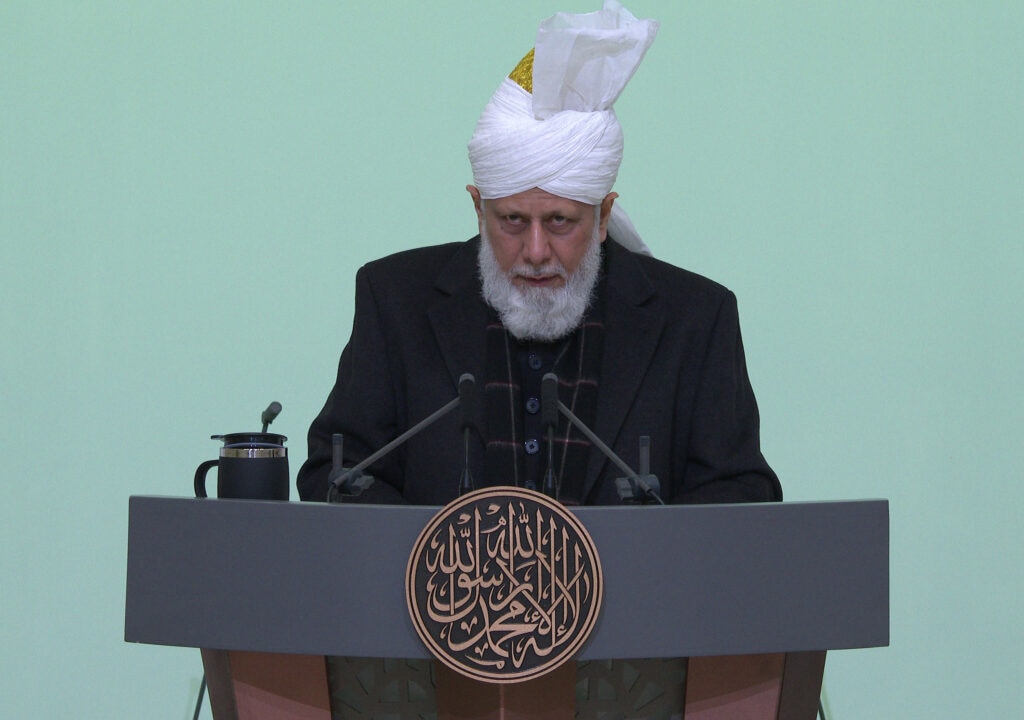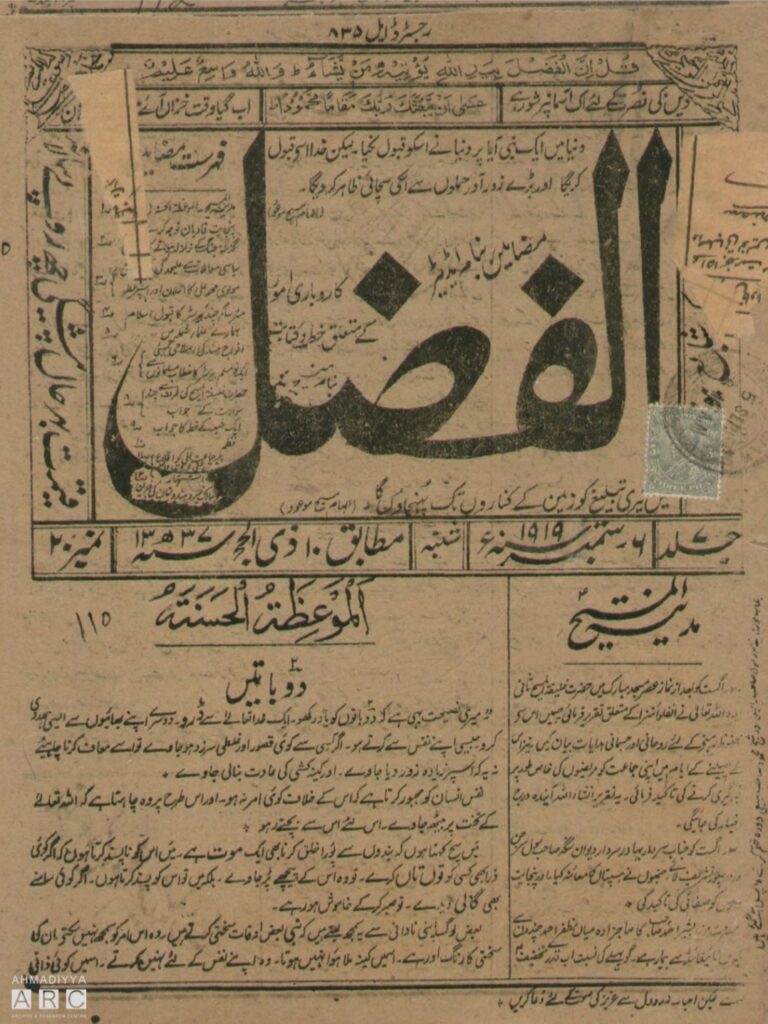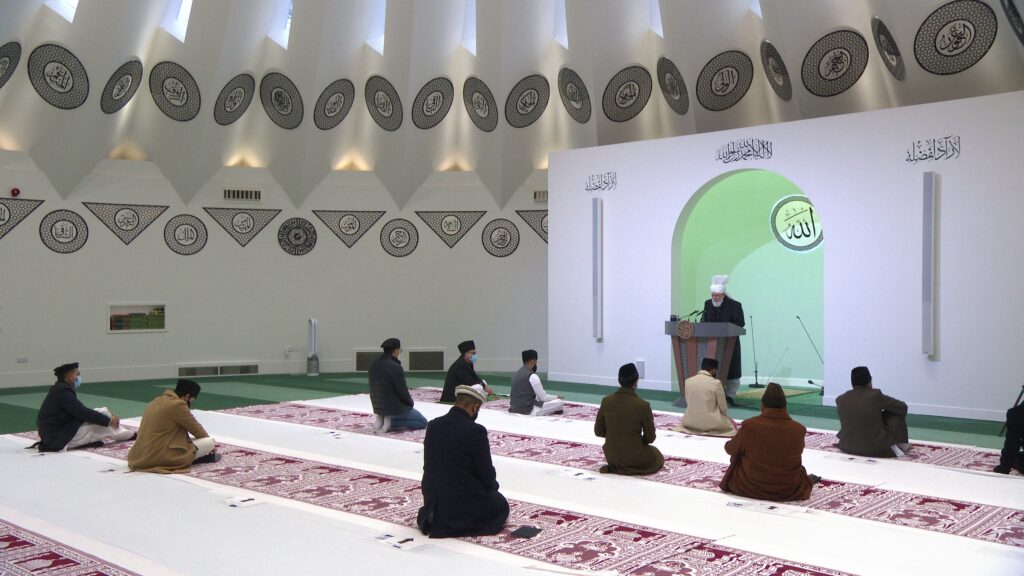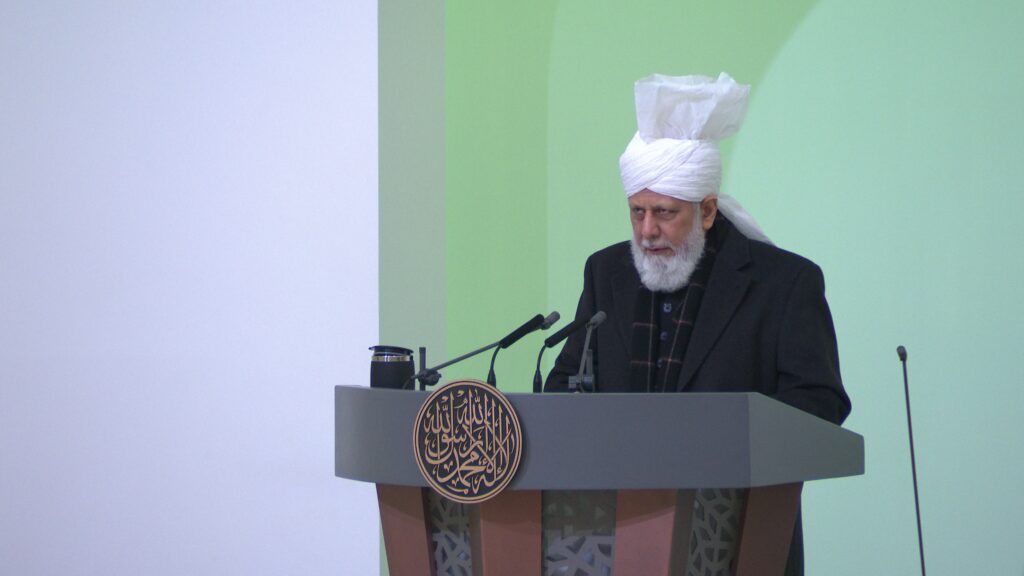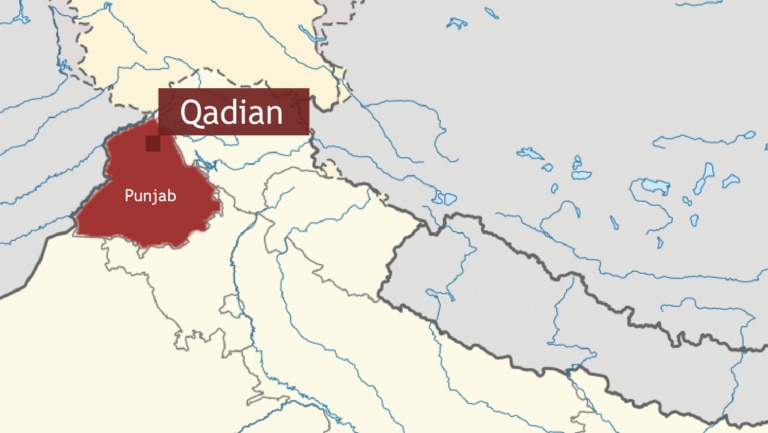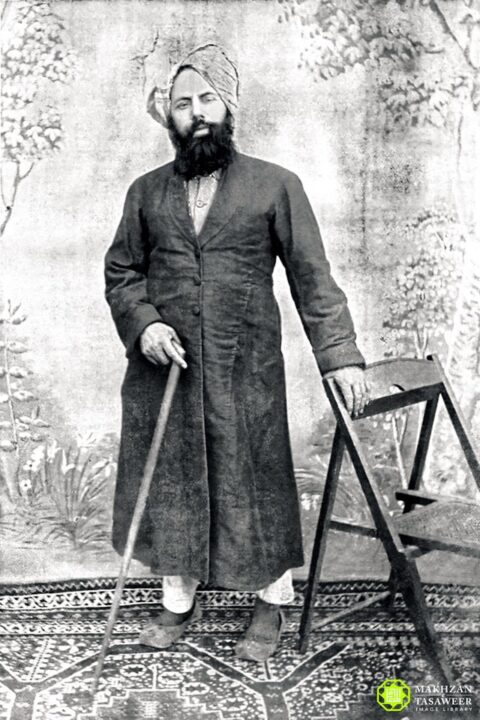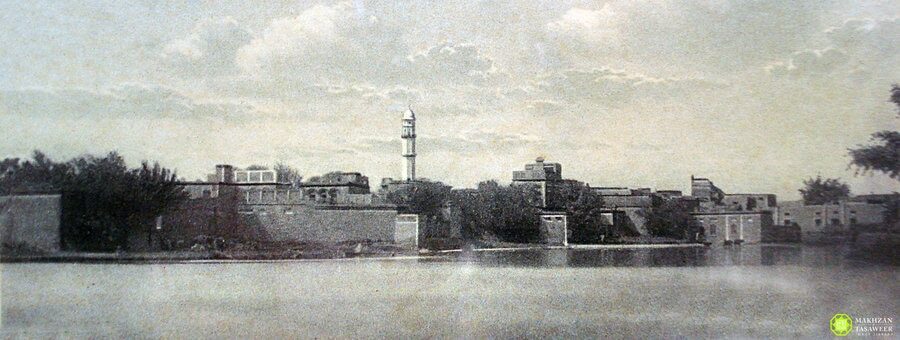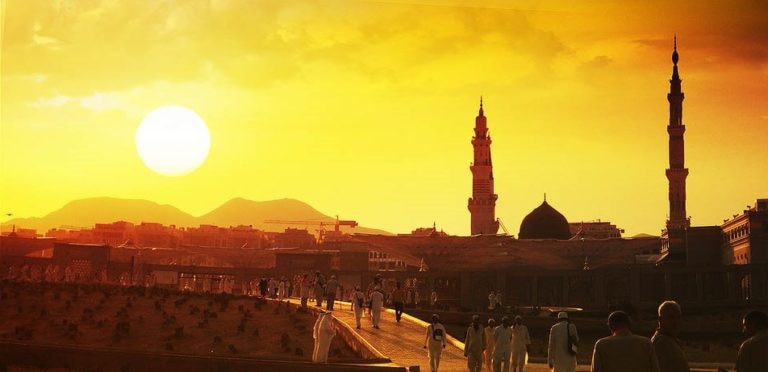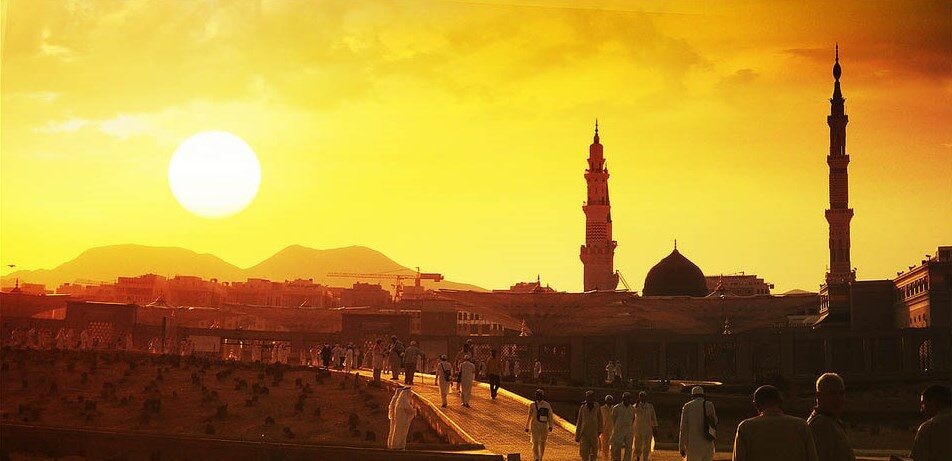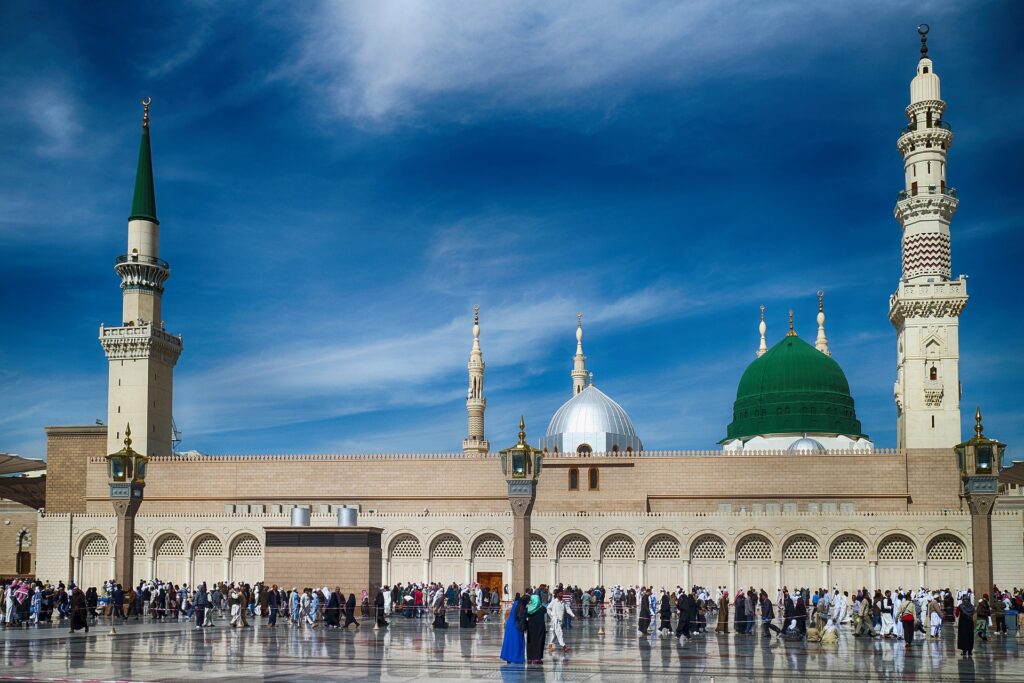Friday Sermon
11 December 2020
Men of Excellence: Hazrat Alira
After reciting Tashahud, Ta‘awuz and Surah al-Fatihah, Hazrat Khalifatul Masih Vaa stated:
I have been narrating accounts from the life of Hazrat Alira and I shall continue to do so today as well as in the coming Friday sermons, insha-Allah.
When Ibn Qami‘ah martyred Hazrat Mus‘abra bin Umair during the Battle of Uhud, he thought that he had martyred the Holy Prophetsa. Hence, he returned to the Quraish and said that he had killed Muhammad[sa]. When Hazrat Mus‘abra was martyred, the Holy Prophetsa handed the flag to Hazrat Alira. Thus, Hazrat Alira and the Muslims continued in the battle. (Ibn Hisham, Al-Sirah al-Nabawiyyah, Ghazwat Uhud, Maqtal Mus‘ab bin Umair [Beirut, Lebanon: Dar al-Kutub al-Ilmiyyah, 2001], 529)
In one of the narrations, it is mentioned that during the Battle of Uhud, the flag-bearer of the idolaters, Talha bin Abi Talha, called out Hazrat Alira and challenged him. Subsequently, Hazrat Alira stepped forward and struck him with such force that he fell to the ground and began to quiver.
Hazrat Alira continuously killed the flag-bearers of the disbelievers one after another. Spotting a group of the disbelievers, the Holy Prophetsa instructed Hazrat Alira to attack them. Hazrat Alira killed Amr bin Abdillah Jumahi and caused that group to disperse. Following this, the Holy Prophetsa instructed him to attack another contingent of the enemy.
Hazrat Alira killed Shai‘bah bin Malik, upon which the angel Gabriel said, “O Messengersa of Allah! Certainly, he deserves your sympathy;” i.e. referring to Hazrat Alira. The Holy Prophetsa replied, “Indeed, Ali is from me and I am from him.” The angel Gabriel replied, “I am from both of you.” (Sharh Zurqani ala al-Mawahib al-Laduniyyah, Vol. 2, p. 409, Bab Ghazwat Uhud, Dar al-Kutub al-Ilmiyyah, Beirut, 1996) (Muhammad Ibn Jarir al-Tabari, Tarikh al-Tabari, Vol. 3, Ghazwat Uhud [Beirut, Lebanon: Dar al-Fikr, 2002], 68)
Hazrat Alira relates:
“During the Battle of Uhud, when the people around the Holy Prophetsa became scattered, I started searching through the bodies of the martyrs, but did not find the Holy Prophetsa. I then said, ‘By God! The Holy Prophetsa would never flee, nor have I found him among the martyrs. Instead Allah is displeased with us and has raised up His Prophetsa. Hence, now it is best for me to continue fighting until I am killed.’ I then broke the sheath of my sword and launched an attack on the disbelievers, which caused them to disperse. Once they had dispersed, I saw that the Holy Prophetsa had been surrounded by them.” (Ali Ibn al-Athir, Usd al-Ghabah fi Ma‘rifat al-Sahabah, Vol. 4, Dhikr Ali bin Abi Talib [Beirut, Lebanon: Dar al-Fikr, 2003], 45)
This is the tale of love and devotion, which began from childhood and manifested itself on each and every occasion.
There is a narration with regard to the injuries sustained by the Holy Prophetsa during the battle of Uhud. Hazrat Sahlra bin Saad was asked about the injuries of the Holy Prophetsa, upon which he said, “If you ask me, then by God, I am fully aware of the person who cleaned the wounds of the Holy Prophetsa.” That is, he vividly remembered that scene and also the one who was washing his wounds and what ointment was applied.
Hazrat Sahlra said, “Hazrat Fatimahra, the daughter of the Holy Prophetsa, was cleaning the wound and Hazrat Alira was using his shield to pour water over it. When Hazrat Fatimahra saw that the water caused more blood to flow from the wound, she took a piece of a sack, burnt it and patched the wound, which stopped the bleeding. On that day, the Holy Prophetsa lost one of his front teeth, his face was wounded and his helmet broke, which injured his head.” (Sahih al-Bukhari, Kitab al-Maghazi, Bab ma Asaba al-Nabisa minal-Jarah Yaum Uhud, Hadith 4075)
Hazrat Saeedra bin Musayyib relates that Hazrat Alira sustained 16 wounds during the Battle of Uhud. (Ali Ibn al-Athir, Usd al-Ghabah fi Ma‘rifat al-Sahabah, Vol. 4, Dhikr Ali bin Abi Talib [Beirut, Lebanon: Dar al-Fikr, 2003], 93)
Whilst discussing the phenomenon that there is a treasure of blessings hidden behind each trial and tribulation, Hazrat Musleh-e-Maudra states:
“When Hazrat Alira returned from the Battle of Uhud, he handed Hazrat Fatimahra his sword and said, ‘Clean this, for today this sword served me well.’ The Holy Prophetsa heard this and said, ‘Ali, it was not only your sword which excelled, rather many of your brethren used their swords exceptionally.’ He then mentioned the names of six or seven companions saying, ‘Their swords were by no means inferior to yours.’” (Masa‘ib ke Neeche Barkaton ke Khazane Makhfi hote hein, Anwar al-Ulum, Vol. 19. p. 59)
In other words, they passed through similar trials and eventually succeeded.
The Battle of Khandaq took place in Shawwal, 5 AH. On this occasion, when the army of the disbelievers had surrounded Medina, the chieftains agreed that they would launch an attack in unison. They began searching for a narrow path in the ditch through which their cavalry could pass and reach the Holy Prophetsa and his Companions, but they were unable to locate such a place. They said that this is a strategy which till today has never been used in Arab lands. They were told that the Holy Prophetsa had a Persian companion who suggested this idea. The disbelievers then said that this must be his suggestion.
Thereafter, they reached a narrow passage of the ditch, which the Muslims were unaware of and Ikramah bin Abi Jahl, Naufal bin Abdillah, Durar bin Khattab, Hubairah bin Abi Wahab and Amr bin Abd Wudd passed through this passage. In order to call out and challenge the Muslims, Amr bin Abd Wudd recited the following couplets:
وَلَقَدْ بَحِحْتُ مِنَ النِّدَاءِ
لِجَمْعِهِمْ هَلْ مِنْ مُبَارِزْ
“I have lost my voice, constantly crying out to the other party, saying, ‘Will anyone come and challenge me?’”
In response to this, Hazrat Alira recited the following couplets:
لَا تَعْجَلَنَّ فَقَدْ اَتَاكَ
مُجِيْبُ صَوْتِكَ غَيْرُ عَاجِزْ
فِيْ نِيَّةٍ وَ بَصِيْرَةٍ
وَالصِّدْقُ مَنْجٰي كُلِّ فَائِزْ
اِنِّيْ لَاَرْجُوْ اَنْ اُقِيْمَ
عَلَيْكَ نَائِحَةَ الْجَنَائِزْ
مِنْ ضَرْبَةٍ نَجْلَاءَ يَبْقَي
ذِكْرُهَا عِنْدَ الْهَزَاهِزْ
“Do not show haste, for the one to answer your call has come, who shall never show weakness nor any frailty.
“Firm resolve, complete sagacity and remaining resolute in the battleground with unwavering resolve is key to each successful victory.
“Indeed, I expect to gather those who wail over a deceased one, to lament over you;
“Whilst causing such a deep wound, which shall be etched in the history of wars.”
When Hazrat Ali bin Abi Talibra said, “O Messengersa of Allah, I shall go and challenge him”, the Holy Prophetsa handed his sword to him, tied his turban for him and supplicated, “O Allah, grant Your support against him” (i.e. against Amr bin Abd Wudd). Hazrat Alira then went forth to confront him. They both approached one another and the dust between them flew up as they battled. Hazrat Alira struck him and killed him. He then exclaimed “Allahu Akbar” [Allah is the Greatest], from which they understood that Hazrat Alira had slain him. Those with Amr bin Abd Wudd fled and were only able to save themselves because of their horses. (Sirat Khatamun-Nabiyyin, Hazrat Mirza Bashir Ahmadra, p. 573) (Ibn Saad, Al-Tabaqat al-Kubra, Vol. 2, Ghazwat Rasulsa Allah al-Khandaq wa hiya Ghazwat al-Ahzab [Beirut, Lebanon: Dar Ihya al-Turath al-Arabi, 1996], 283) (Ibn Kathir, Al-Bidayah wa al-Nihayah, Vol. 4, Ghazwat al-Khandaq wa hiya Ghazwat al-Ahzab [Beirut, Lebanon: Dar al-Kutub al-Ilmiyyah, 2001] 115)
Whilst giving further details of this incident, Hazrat Mirza Bashir Ahmad Sahibra writes:
“Amr was an extremely renowned swordsman and due to his bravery, was considered to be the like of 1,000 warriors by himself. Since he had returned from Badr frustrated and unsuccessful, his heart was charged with feelings of malice and revenge. As soon as he took to the field, he called for a duel in a very arrogant manner, asking if there was anyone who would confront him. Certain Companions were reluctant in confronting him, but Hazrat Alira stepped forward to square up to him with the permission of the Holy Prophetsa. The Holy Prophetsa bestowed his own sword to him and prayed for him.
“Hazrat Alira advanced and said to Amr, ‘I have heard that you have vowed that if a person from the Quraish requests two things of you, you shall accept one of the two.’ ‘Indeed’, said Amr. Hazrat Alira responded, ‘Then I ask you first to embrace Islam and become the recipient of divine favours by accepting the Holy Prophetsa.’ ‘This is not possible’, said Amr. Hazrat Alira said, ‘If not this, then come forward and prepare to battle me.’
“At this, Amr began to laugh and said, ‘I did not believe that anyone would ever muster the courage to say such words to me.’ Then he asked Hazrat Alira to provide his name and line of descent and upon hearing his lineage, he said, ‘Nephew! You are still a child. I do not wish to spill your blood; send forth your elders.’ ‘You do not wish to spill my blood’, said Hazrat Alira, ‘but I feel no hesitation in spilling yours.’
“Upon hearing this, Amr became blind in rage and after jumping from his horse, hamstrung it (so that there was no way to return). Then he madly marched forward towards Hazrat Alira like a fierce flame of fire and wielded his sword against him with such force, that it cut through the shield of Hazrat Alira and struck his forehead, who was wounded to some extent. However, Hazrat Alira retaliated with such lightning speed, calling out a slogan of God’s greatness, that Amr was left fending for his life. The sword of Hazrat Alira penetrated his shoulder and cut him to the ground. Amr fell to the ground and gave up his life tossing and turning in agony.” (Sirat Khatamun-Nabiyyin, Hazrat Mirza Bashir Ahmadra, pp. 588-589)
After the death of Amr bin Abd Wudd, the disbelievers sent word to the Holy Prophetsa that they would give 10,000 dirhams in exchange for his corpse. In response to this, the Holy Prophetsa said, “Take it, for we do not wish to make money of the deceased.” (Ibn Kathir, Al-Bidayah wa al-Nihayah, Vol. 4, Ghazwat al-Khandaq wa hiya Ghazwat al-Ahzab [Beirut, Lebanon: Dar al-Kutub al-Ilmiyyah, 2001] 116)
Hazrat Barara bin Azib narrates that when the Holy Prophetsa made the treaty at Hudaibiyah, Hazrat Alira bin Abi Talib was the scribe who wrote down the document between them. He had written down the name “Muhammad, the Messenger of Allah”. The idolaters said, “Do not write Muhammad, Messenger of Allah, for if you were a messenger, we would not have any dispute with you.”
The Holy Prophetsa instructed Hazrat Alira to erase it. Hazrat Alira said that he would not be the one to erase it. The Holy Prophetsa then erased it by his own hand and agreed to the pact on the condition that he and his Companions could remain in Mecca for three days and they would enter having kept their weapons in the Julubban. The people asked, “What is a Julubban?” The Holy Prophetsa replied, “The outer covering in which the sword and its sheath are placed in.” (Sahih al-Bukhari, Kitab al-Sulh, Bab kaifa Yuktabu hadha: Ma Salaha Fulan ibn Fulan…, Hadith 2698, Urdu Tarjamah Sahih al-Bukhari, Vol. 5, pp. 12-13, Nazarat Ishaat)
Hazrat Musleh-e-Maudra has narrated this incident in a more detailed manner. He states:
“When the Holy Prophetsa arrived at the meeting of Hudaibiyah and the disbelievers were presenting their conditions for the treaty, the companions were seated and were boiling with fury from within, owing to atrocities which were continuously committed by the disbelievers against them for 20 years. Their swords were unsheathed and they waited for any opportunity to exact revenge for the atrocities they committed against Islam. But the Holy Prophetsa listened to what the disbelievers had to say and when they proposed the idea to enter into a treaty, he said, ‘Very well, let us form a treaty.’
“The disbelievers then said, ‘[We will enter the treaty] on the condition that this year you cannot perform the Umrah [pilgrimage]’ The Holy Prophetsa replied, ‘Very well, this year we shall not perform the Umrah. Then the disbelievers said, ‘When you come the following year to perform the Umrah, you may not remain in Mecca for longer than three days.’ The Holy Prophetsa answered, ‘Very well, I accept this condition.’ They then said, ‘You shall not be permitted to enter Mecca with your weapons.’ The Holy Prophetsa said, ‘Very well. We shall not enter Mecca armed.’
“As the conditions of the treaty were being agreed upon, the companions were boiling with anger. Deep down they were restless owing to their anger, but could not do anything. Hazrat Alira was appointed to write up the treaty. When he began writing it by stating that this treaty was being formed between the party of Muhammadsa, the Messenger of Allah, and his Companions and the party of such and such chieftains of Mecca and the people of Mecca, this enraged the disbelievers who said, ‘We cannot tolerate these words for we do not accept Muhammad[sa] as the Messenger of Allah. If we did, then there would be no matter of contention between us. We are forming a treaty with him in his capacity as Muhammad[sa], son of Abdullah, not with Muhammad[sa], the Messenger of Allah. Thus, these words cannot be included in the treaty.’
“At that moment, the emotions of the Companions could hardly be contained and they began to tremble with fury. They thought that God had created another opportunity whereby the Holy Prophetsa would not accept what the disbelievers said and they would be allowed to fight and thus be able to let out the deep emotions they felt within themselves. However, the Holy Prophetsa said, ‘They are right; the words “Messenger of Allah” should be erased from the treaty.’ He then said to Hazrat Alira, ‘Ali, erase these words.’
“Although Hazrat Alira was an exemplary model when it came to obedience, in that moment his heart began to tremble and tears began to flow from his eyes as he said, ‘O Messenger of Allahsa! I am unable to erase these words.’ The Holy Prophetsa then said, ‘Give the parchment to me.’ He took it, and with his own hands, erased the words, ‘Messenger of Allah.’” (Khutbat-e-Mahmud, Vol. 20, pp. 379-381, delivered 8 September 1939)
There is a long narration in Sahih Muslim regarding the Battle of Khaibar, which took place in Muharram and Safar 7 AH. Hazrat Salamara bin Akwa narrates, “When we reached Khaibar, their chief Marhab came out wielding his sword as he said, ‘Khaibar knows very well that I am Marhab and when battles come blazing forth, I am an armed, brave and an experienced warrior,’” meaning that he would display his bravery in such circumstances.
The narrator continues, “My uncle Amir went forth to combat him whilst saying, ‘Khaibar knows that I am Amir, the armed, brave, and one who puts himself in the face of danger.’”
The narrator further says, “Both traded blows; Marhab’s sword struck Amir’s shield. Amir tried to attack him from below the shield but he struck himself with his own sword which severed an artery as a result of which he was martyred.”
Salamara continues, “When I left from there, I heard some companions of the Holy Prophetsa saying that Amir’s deeds went in vain as he had killed himself.”
He then further narrates:
“I went to the Holy Prophetsa and was crying. I asked him, ‘O Messengersa of Allah, have Amir’s deeds been wasted?’ The Holy Prophetsa replied, ‘Who has said this?’ I replied, ‘Some of your companions have said this.’ The Holy Prophetsa said, ‘Whoever said this is incorrect. In fact, he [Amir] has earned a double reward.’ Then the Holy Prophetsa sent me to Hazrat Alira, who, at the time, was experiencing an ailment of the eyes. The Holy Prophetsa then said, ‘I will give this flag to he who loves Allah and His Messengersa, or he whom Allah and His Messengersa love.’”
The narrator continues to say, “I went to Hazrat Alira and brought him with me as he had some discomfort in his eyes (due to some ailment as a result of which they were swollen). Therefore, I took him along with me until we reached the Holy Prophetsa. He placed some of his saliva on Hazrat Ali’sra eyes as a result of which his pain was alleviated and then the Holy Prophetsa gave him the flag. Thereafter, Marhab came forward and said, ‘Khaibar knows that I am Marhab, and when battle rages forth, I am armed, brave and experienced.’
Hazrat Alira responded by saying,
أَنَا الَّذِي سَمَّتْنِي أُمِّي حَيْدَرَهْ
كَلَيْثِ غَابَاتٍ كَرِيْهِ الْمَنْظَرَهْ
اُوفِيْهِمُ بِالصَّاعِ كَيْلَ السَّنْدَرَهْ
‘My mother named me “Haidar”; the one who resembles a ferocious lion that roams the jungle. I shall give a Sandarah in exchange for a sa‘.’”
This is an Arabic idiom, which has the Urdu equivalents as:
سير كے مقابلے ميں سوا سير
This means to return someone’s attack with one that is fiercer. The literal meaning of sandarah is something in large scale, whilst one sa‘ only comprises of three seir [unit of measurement], thus a sandarah is greater.
The narrator continues, “After saying this, Hazrat Alira struck Marhab on his head and killed him. Thus, Khaibar was conquered at the hands of Hazrat Alira.”
This narration is from Sahih Muslim. (Sirat Khatamun-Nabiyyin, Hazrat Mirza Bashir Ahmadra, p. 837) (Sahih Muslim, Kitab al-Jihad wa al-Siyar, Bab Ghazwah dhi Qirad wa Ghairiha, Hadith 4678, Urdu Tarjamah Sahih Muslim, Vol. 9, p. 240 with endnote, Noor Foundation)
Whilst mentioning the same incident, Hazrat Musleh-e-Maudra says:
“Hazrat Alira was granted an opportunity on the day of Khaibar, when the Holy Prophetsa said, ‘Today I shall grant an opportunity to he who loves God and whom God Almighty loves and will give my sword to him who God Almighty has granted excellence.’ Hazrat Umarra says that he was present in that gathering and he raised his head hoping that the Holy Prophetsa would see him and grant him the sword. However when the Holy Prophetsa looked towards him he remained silent.
“Hazrat Umarra raised his head again, yet upon seeing him, the Holy Prophetsa still remained silent. Then Hazrat Alira came and he was experiencing pain in his eyes. The Holy Prophetsa said, ‘Ali, come forward.’ When Hazrat Alira stepped forward, the Holy Prophetsa placed his saliva on Hazrat Ali’sra eyes and said, ‘May Allah Almighty heal your eyes. Take this sword which Allah Almighty has entrusted to you.’” (Khutbat-e-Mahmud, Vol. 19, p. 614, delivered 2 September 1938)
Hazrat Musleh-e-Maudra has mentioned the same incident in another instance when he says:
“Around five months after the Holy Prophetsa had returned from Hudaibiyyah, it was decided that the Jewish people who resided in Khaibar should be expelled for they resided only a short distance away from Medina and could easily plot against them. Thus, the Holy Prophetsa took 1,600 Companions with him and set out towards Khaibar in August 628 CE. Khaibar was a fortified city as there were forts on hills at all four corners of the city. To conquer such a well-protected city with such a small amount of people was no easy task. Various small watch-posts were overtaken after some small skirmishes; however, when all the Jewish people gathered at the central fortress of the city, all plans to conquer it began to falter.
“One day, God Almighty informed the Holy Prophetsa that this city was destined to be conquered at the hand of Hazrat Alira. Thus, in the morning, the Holy Prophetsa announced that he would bestow the black coloured flag of Islam to he who was loved by God, His Messengersa and by the Muslims, for God had decreed this fortress to be conquered at his hand. Then, the next morning, the Holy Prophetsa summoned Hazrat Alira and granted him the flag, who then led the Muslim army and attacked the fortress. Though the Jewish people were well protected, Allah the Almighty granted Hazrat Alira and other Companions such strength on this day, that before nightfall, the fortress had been conquered.” (Dibachah Tafsir al-Quran, Anwar al-Ulum, Vol. 20, pp. 325-326)
Then, at another instance, with reference to Hazrat Alira and the same incident, Hazrat Musleh-e-Maudra states,
“When the matter of conquering the fortress of Khaibar arose, the Holy Prophetsa called Hazrat Alira and desired to bestow upon him the flag of the Muslim army; however, Hazrat Alira was experiencing pain in his eyes (here, it is mentioned that his eyes were hurting) and due to the extreme pain, his eyes had become swollen. The Holy Prophetsa saw the state Hazrat Alira was in and said to him, ‘Come here.’ When Hazrat Alira went towards him, the Holy Prophetsa placed his saliva on the eyes of Hazrat Alira and his eyes were immediately relieved of the pain.” (Tafsir-e-Kabir, Vol. 8, pp. 398-399)
In another instance, whilst mentioning how the Holy Prophetsa granted cure through his blessed hands, Hazrat Musleh-e-Maudra states:
“We witness such examples in this world wherein certain people stricken with illness are miraculously cured without even undergoing any medical treatment, or at times, they are granted cure when the medical treatment proves unsuccessful. A similar kind of incident in regard to granting cure is found in the life of the Holy Prophetsa during the Battle of Khaybar. During the Battle of Khaybar, the Holy Prophetsa stated, ‘The victory of Khaybar has been destined with the one whom I grant my flag to.’ Hazrat Umarra relates that when the time [of battle] approached, he raised his neck and began to look around in the hope that perhaps the Holy Prophetsa would grant him the flag. However, the Holy Prophetsa did not assign him with this duty. In the meanwhile, Hazrat Alira came and at the time, he was experiencing a lot of pain in the eyes. The Holy Prophetsa placed his blessed saliva upon his eyes and he was immediately cured from the ailment of his eyes. The Holy Prophetsa then placed the flag in Hazrat Alira’s hand and entrusted him with the conquest of Khaibar.” (Hasti-e-Bari Ta‘ala, Anwar al-Ulum, Vol. 6, p. 327)
Hazrat Musleh-e-Maudra states:
“There is a very faith-inspiring incident of Hazrat Alira. During the Battle of Khaybar, Hazrat Alira went against a very prominent general of the Jews. Since he was also a very skilled fighter, therefore they both continued to fight each other for a long time. Eventually, Hazrat Alira felled him to the ground and knelt upon his chest with the intention to cut his head off with the final stroke of his sword. However, he spat on Hazrat Alira’s face and Hazrat Alira immediately stood away from him.
“The Jew was surprised at the fact that Hazrat Alira had overcome him and yet had now let him go. Why would he let him go even though he easily had the opportunity to kill him, he thought. And so, he enquired from Hazrat Alira as to why he let him go. Hazrat Alira replied, ‘Till this point, I was fighting against you purely for the sake of attaining Allah’s pleasure; however, when you spat at me, I became angry and felt that now if I were to kill you, then it would not be for the sake of Allah, but owing to my personal anger. Thus, I let you go so my anger subsides, lest I kill you for a personal reason.’
“How great of an example was this which was demonstrated by Hazrat Alira. Right in the midst of battle, he let a bitter enemy go free simply because he did not wish to kill him owing to any personal grievance. Rather if he did so then it would only be for the sake of Allah alone.”
(Sair-e-Ruhani, Number 2, Anwar al-Ulum, Vol. 16, p. 74)
According to the narrations, it is stated that Hazrat Alira read out the opening verses of Surah al-Taubah on the occasion of Hajj. The narration is as follows; Abu Ja’far Muhammad bin Ali relates:
“When Surah Bara‘ah (Surah al-Taubah) was revealed to the Holy Prophetsa, he had already sent Hazrat Abu Bakrra as the Amir of the Hajj. A suggestion was put before the Holy Prophetsa to send this chapter [Surah] to Hazrat Abu Bakrra so that he could recite it there. The Holy Prophetsa stated, ‘No one can fulfil this responsibility apart from someone among the members of my household.’ Thereafter, the Holy Prophetsa called for Hazrat Alira and stated, ‘On the day when the people gather in Mina to offer their sacrifice, announce before them what has been mentioned in the opening part of Surah al-Taubah which is that a kafir [disbeliever] shall not enter Paradise. Also, after this year, no idolater will be permitted to perform the Hajj, nor will they be permitted to perform the Tawaf [circuits] around the House of Allah, whilst naked and whoever has entered into a treaty with the Holy Prophetsa, the complete duration of that treaty will be honoured.’
“Subsequently, Hazrat Ali bin Abi Talibra mounted upon the camel of the Holy Prophetsa called Adhba and left [for Mecca]. Whilst on route, he caught up with Hazrat Abu Bakrra. Upon seeing him, Hazrat Abu Bakrra asked, ‘Have you been appointed as the amir, or will you be under me?’ Hazrat Alira replied, ‘I will serve under you.’ Thus, they both continued their journey and Hazrat Abu Bakrra oversaw all the matters in relation to the Hajj.
“That year, the Arabs had camped in the same place where they previously used to camp during the Jahiliyyah [era of ignorance prior to the advent of Islam]. When it was the day to offer their sacrifices, Hazrat Alira stood up and just as he had been instructed by the Holy Prophetsa, he announced before the people, ‘O people, no disbeliever shall enter paradise. And after this year, no idolater shall be permitted to perform the Hajj, nor will they be permitted to perform the Tawaf [circuits] around the House of Allah naked, and whoever has entered into a treaty with the Holy Prophetsa, the complete duration of that treaty will be honoured.’
“Everyone was granted a duration of four months from the moment of that announcement, so that all the tribes could reach their respective areas and places of safety. And after the passing of that duration, no idolater would have any kind of treaty or pact, nor would they be responsible for them in regards to this, except if they had entered into a treaty with the Holy Prophetsa.” In other words, if the duration of a treaty still remained, then that would continue to be honoured but there would be no new treaty or pact [for the idolaters to perform Hajj].
“After that year, no idolater performed the Hajj, nor did anyone perform the Hajj whilst naked. Thereafter, Hazrat Alira and Hazrat Abu Bakrra returned to the Holy Prophetsa.” (Ibn Hisham, Al-Sirah al-Nabawiyyah, Hajj Abi Bakr bi al-Nas… [Beirut, Lebanon: Dar al-Kutub al-Ilmiyyah, 2001], 832)
The following narration has already been mentioned with reference to another companion; however, I shall mention it again in regard to Hazrat Alira.
This event took place on the occasion of the Conquest of Mecca, in Ramadhan 8 AH, January of 630 CE. Hazrat Alira narrates that the Holy Prophetsa sent him, Hazrat Zubairra and Miqdadra bin Aswad to Raudh Khaakh – this event in fact took place before the conquest of Mecca – and the Holy Prophetsa stated to them, “Go forth and when you reach Raudh Khaakh, there you will find a woman who will be mounted upon a camel and she has a letter. Take the letter from her.”
Hazrat Alira further relates, “Subsequently, we raced off on our horses and reached Raudh Khaakh. Upon reaching there, we indeed found a woman mounted on a camel. We instructed her to hand over the letter; however, she denied having any letter. We then warned her that either she should produce the letter or we would be compelled to remove her clothes in order to search for it. Upon this, she took out the letter which was concealed in the bun of her hair and handed it over to us. We took the letter and returned to the Holy Prophetsa. Upon opening the letter, we discovered that Hatibra bin Abi Balta had addressed some of the idolaters of Mecca and was revealing information about a certain plan of the Holy Prophetsa. The Holy Prophetsa called for Hatibra bin Abi Balta and asked him to explain the matter. Hatibra submitted, ‘O Messengersa of Allah! Please do not make a decision in haste with regard to me. [The reason I have done this is because] I am not from the Quraish, but in fact I came and joined them. However, the other Muhajireen who are with you have relations in Mecca through which they are able to safeguard their wealth and properties. Therefore, since I have no relations there, I wished to do a favour for the people of Mecca, with the intention that perhaps through this favour of mine, they will have some regard for me. I did not commit this act owing to disbelief or apostasy, or owing to any hypocrisy” – he stated that neither was he a disbeliever, nor an apostate and he did not commit this act for any of those reasons – “nor can I ever give preference to disbelief after having accepted Islam. I assure you of this.’ Upon this, the Holy Prophetsa stated, ‘Indeed, you have spoken the truth.’ In other words, he accepted what he had said.” (Sirat Khatamun-Nabiyyin, Hazrat Mirza Bashir Ahmadra, p. 840) (Sahih al-Bukhari, Kitab al-Jihad, Bab al-Jasus, Hadith 3007, Urdu Tarjamah Sahih al-Bukhari az Hazrat Sayed Zain al-Abidin Wali Allah Shah Sahib, Vol. 5, pp. 350-352, Nazarat Ishaat)
Whilst narrating this incident, Hazrat Musleh-e-Maudra states:
“A weak companion disclosed to the Meccans that the Holy Prophetsa was departing for Mecca with an army of 10,000 companions. [In the letter] he wrote, ‘I am not aware exactly where the Holy Prophetsa is heading towards but I assume he is travelling to Mecca. Some of my close relations and family relatives live in Mecca, I hope that during this difficult hour you will extend them your help and support and not allow them to be harmed in any way.’
“This letter had not reached Mecca yet, when the Holy Prophetsa called for Hazrat Alira in the morning and stated, ‘Go to such and such place, for Allah the Almighty has informed me that you will find a woman there who will be mounted upon a camel and will have a letter which she will be taking to the Meccans. Take the letter from her and immediately return to me.’ When Hazrat Alira was about to leave, the Holy Prophetsa stated, ‘Remember, she is a woman, therefore do not treat her harshly. Try to pressure and persuade her to admit that she has a letter; however, if she still does not comply despite your efforts to convince her, then you may take strict action, even if you have to kill her, but you must not allow that letter to reach [Mecca].
“And so, Hazrat Alira reached that particular location and also found that woman. When she was asked to be searched, she began to cry and swore that she was not a traitor or a cheat. In any case, they searched her and looked into her pockets and possessions but could not find the letter. The Companionsra suggested that it seemed she did not have the letter. However, Hazrat Alira became impassioned and told them to remain silent. He then very passionately stated, ‘I swear by Allah, the Messengersa of Allah can never utter a lie.’ And so he told the woman, ‘The Messengersa of Allah has told us that you have a letter and I swear by God, I am not lying.’
“After this, Hazrat Alira drew his sword and said, ‘Produce the letter, otherwise if I have to take off all of your clothes and search, then I will do that because the Messengersa of Allah has indeed spoken the truth and you are the one who is lying.’ Thus, she became frightened and upon being threatened to have her clothes removed, she quickly took the letter out from the bun of her hair and gave it over.” (Sair-e-Ruhani, Number 7, Anwar al-Ulum, Vol. 24, pp. 262-263)
In another instance, whilst narrating the details of this incident, Hazrat Musleh-e-Maudra stated:
“During the lifetime of the Holy Prophetsa, one of the companions tried to secretly reveal information to his relatives in Mecca about the plans of the Muslims to attack Mecca so that owing to this act of compassion, they would in turn afford kind treatment to his relatives. However, the Holy Prophetsa was informed of this by divine revelation. The Holy Prophetsa sent Hazrat Alira along with a few other companions to a particular place and told them to retrieve a letter from a woman. Upon reaching there, they demanded the letter from that woman; however, she denied having it. Some of the companions thought that perhaps the Holy Prophetsa had made a mistake. However, Hazrat Alira insisted that this was not the case and that the Holy Prophetsa could never be wrong. He stated that until she did not produce the letter, he would not leave. Hazrat Alira then admonished the woman and as a result, she produced the letter and gave it to them.” (Khutbat-e-Mahmud, Vol. 4, p. 182, 183, delivered 25 September 1914)
On the occasion of the Conquest of Mecca, whilst the Holy Prophetsa was sat in Masjid al-Haram, Hazrat Alira presented himself before the Holy Prophetsa and gave him the keys to the Ka‘bah. He submitted, “O Messengersa of Allah, assign us the duties of providing water during the days of Hajj as well as overseeing the opening and closing of the door of the Ka‘bah.” The Holy Prophetsa stated, “Where is Uthman bin Talha?” Subsequently he was called for and the Holy Prophetsa stated, “O Uthman! This is your key. Today is the day of virtue and loyalty.” The Holy Prophetsa then stated to Hazrat Alira, “I shall not give you something as a result of which you will be burdened with hardship and difficulty; rather, I will give you that which is better for you and a source of blessing. And nor will I give you something which you yourselves have a desire for”, i.e. he would not bestow it because he had asked for it. (Ibn Hisham, Al-Sirah al-Nabawiyyah, Dukhul al-Rasul al-Haram [Beirut, Lebanon: Dar al-Kutub al-Ilmiyyah, 2001], 744)
Hazrat Umm Hanira bint Abi Talib narrates:
“When the Holy Prophetsa stayed in the elevated part of Mecca, two of my in-laws from the Bani Makhzum tribe ran away and came to me.” Hazrat Umm Hanira further states, “My brother, Ali [bin Abi Talib] came to me and said, ‘By God! I will kill them both.’” Hazrat Umm Hanira states: “I shut them both inside the house. I then went to the Holy Prophetsa in the upper part of Mecca. I found that he was bathing at the time using a container which had remnants of dough inside. His daughter, Hazrat Fatimahra was holding a cloth for a covering around him. After bathing, the Holy Prophetsa changed his clothes and then offered eight rak‘aat [units of prayer] of voluntary prayer at mid-morning. After this, he turned to me and said, ‘Welcome O Umm Hani! What brings you here?’”
She then informed him about the incident with the two men and what Hazrat Alira had said about killing them and also that she had hid them inside her house. The Holy Prophetsa stated, “We also give refuge to whoever you granted refuge and I assure the safety of those whom you granted protection” i.e. the Holy Prophetsa ordered Hazrat Alira not to kill them. (Ibn Hisham, Al-Sirah al-Nabawiyyah, Min Amr Rasul Allahsan bi Qatlihim [Beirut, Lebanon: Dar al-Kutub al-Ilmiyyah, 2001], 743-744)
The Holy Prophetsa passed the verdict of death for Huwairith bin Nuqaid as he had greatly persecuted the Holy Prophetsa in Mecca and devised a number of schemes to cause him harm and would also revile him. When Hazrat Abbasra, the uncle of the Holy Prophetsa, prepared the camel for Hazrat Fatimahra and Hazrat Umm Maktum to leave from Mecca to Medina and they sat down, Huwairith caused the camel to fall down. Hazrat Alira killed Huwairith on the occasion of the Conquest of Mecca when he had already fled from there. (Ali bin Burhan al-Din al-Halabi, Al-Sirah al-Halabiyyah, Vol. 3, Bab Dhikr Maghaziyah [Beirut, Lebanon: Dar al-Kutub al-Ilmiyyah, 2002], 131)
The Battle of Hunain took place in Shawwal of 8 AH. In a narration, it is stated that during the Battle of Hunain, the flag of the Muhajireen was carried by Hazrat Alira. During the Battle of Hunain, owing to a ferocious attack by the disbelievers, only a handful of companions remained around the Holy Prophetsa and Hazrat Alira was among them. (Sirat Khatamun-Nabiyyin, Hazrat Mirza Bashir Ahmadra, p. 840) (Ibn Saad, Al-Tabaqat al-Kubra, Vol. 2, Dhikr Adad Maghazi Rasul Allahsa … [Beirut, Lebanon: Dar Ihya al-Turath al-Arabi, 1996], 325)
In the Battle of Hunain, a man on a red camel was carrying a black flag ahead of the ranks of the idolaters. This flag was tied to a long spear. The people of the Banu Hawazin were stood behind him. If anyone came within his reach, he would strike them and kill them, but if that person evaded his attack, he would raise his spear to indicate to the people behind and they would launch a sudden attack and they continuously remained behind the man on the red camel.
This man continued to attack in this manner. All of a sudden, Hazrat Alira and a person from the Ansar turned to him and went forward to kill him. Hazrat Alira came from behind him and struck his camel on the hip [joint] as a result of which the camel fell down backwards. Instantly the man from the Ansar attacked him with such force that his leg was severed from the middle of his calf. At this moment the Muslims launched a fierce attack against the idolaters. (Ali bin Burhan al-Din al-Halabi, Al-Sirah al-Halabiyyah, Vol. 3, Bab Dhikr Maghaziyah [Beirut, Lebanon: Dar al-Kutub al-Ilmiyyah, 2002], 158)
With regard to Hazrat Ali’sra expedition to the Banu Tayy, it is stated that the Holy Prophetsa sent Hazrat Alira along with 150 men to destroy the idol of the Banu Tayy called Fuls. The Banu Tayy lived to the north east of Medina. During this expedition, the Holy Prophetsa gave Hazrat Alira a large black flag as well as a smaller white flag. In the morning, Hazrat Alira launched an attack on the people of Hatim and destroyed the idol of Fuls. Hazrat Alira returned to Medina having acquired a large amount of spoils of the Banu Tayy including captives. (Ibn Saad, Al-Tabaqat al-Kubra, Vol. 2, Sariyah Ali bin Abi Talib ila al-Falas [Beirut, Lebanon: Dar Ihya al-Turath al-Arabi, 1996], 331)
With regards to the Battle of Tabuk which took place in Rajab 9 AH, Mus‘abra bin Saad narrates an incident on the authority of his father that when the Holy Prophetsa departed for Tabuk, he appointed Hazrat Alira in charge of Medina in his absence. Hazrat Alira said, “Are you leaving me behind with the women and children?” The Holy Prophetsa stated, “Are you not pleased that you have the same relation to me that Aaronas had with Mosesas, with the exception that there is no prophet after me.” (Sirat Khatamun-Nabiyyin, Hazrat Mirza Bashir Ahmadra, p. 842) (Sahih al-Bukhari, Kitab al-Maghazi, Bab Ghazwat Tabuk wa hiya Ghazwat al-Usrah, Hadith 4416)
Narrating this incident, Hazrat Musleh-e-Maudra states, “On one occasion, the Holy Prophetsa left for a battle and left Hazrat Alira in charge in his absence. Only the hypocrites remained behind and owing to this, he became worried. He went to the Holy Prophetsa and requested to take him along with him. The Holy Prophetsa reassured him by saying:
اَلَا تَرْضٰی اَنْ تَكُوْنَ مِنِّیْ بِمَنْزِلَةِ هَارُوْنَ مِنْ مُّوْسٰی اِلَّا اَنَّهٗ لَيْسَ نَبِیٌّ بَعْدِیْ
“Meaning, ‘O Ali! You are to me as Aaronas was to Mosesas. Just like Aaronas, after me you shall be a Caliph, the difference being that you will not be a prophet.’”
(Khilafat-e-Rashidah, Anwar al-Ulum, Vol. 15, p. 579)
With regard to Hazrat Alira being sent to Yemen, it is mentioned in a narration that in 10 AH, the Holy Prophetsa sent Hazrat Alira to Yemen. Prior to this, the Holy Prophetsa sent Hazrat Khalidra bin Walid towards the people of Yemen to invite them towards Islam, but they refused. Upon this, the Holy Prophetsa sent Hazrat Alira. Hazrat Alira read the letter of the Holy Prophetsa before the people of Yemen as a result of which the entire residents of Hamadan accepted Islam in a single day. Hazrat Alira wrote a letter to the Holy Prophetsa informing him of their acceptance of Islam. Owing to this, the Holy Prophetsa recited three times: “May peace be upon the people of Hamadan.” Hamadan is situated in Yemen and is approximately 1,150 kilometres south east of Medina. After this, the people of Yemen accepted Islam. Hazrat Alira wrote to the Holy Prophetsa informing him about this, upon which he prostrated out of gratitude.
(Al-Kamil fi al-Tarikh, Vol. 2, p. 168, Dhikr Irsal Ali ila al-Yaman wa Islam Hamadan, Dar al-Kutub al-Ilmiyyah, Beirut, 2006) (Ghazwat wa Saraya az Allamah Muhammad Azhar Fareed Shah, p. 550, Fareed Publications Sahiwal, 2018)
Hazrat Alira states, “The Holy Prophetsa appointed me as a qazi [judge] and sent me to Yemen. I said to the Holy Prophetsa, ‘You are sending me [to Yemen] but I am young and do not know anything about matters of arbitration.’ To this the Holy Prophetsa stated, ‘Allah will certainly guide your heart and bless your words. Whenever two people are sat before you who are involved in a dispute, do not issue your verdict until you listen to both of their accounts. This will make it easy for you to make your decision.’” Hazrat Alira states that after this, he never faced any difficulty in making a decision. (Sunan Abi Dawud, Kitab al-Aqdiyah, Bab Kaif al-Qada, Hadith 3582)
Hazrat Amrra bin Shas Aslami, who was part of the Treaty of Hudaibiyyah, states:
“On one occasion, I travelled to Yemen with Hazrat Alira. During the journey he dealt with me in a strict manner and I began to harbour grievances against him. Thus, when we returned from Yemen, I complained about him in the mosque and the Holy Prophetsa came to know about my complaint. One day, when I entered the mosque, the Holy Prophetsa was sitting with a few of his companions. When the Holy Prophetsa saw me, he observed me closely.” He further narrates, “The Holy Prophetsa looked towards me intently. When I sat down, the Holy Prophetsa said, ‘O Amr! By God, you have caused me pain!’ I replied, ‘O Messengersa of Allah! I seek refuge in Allah from that which causes you pain.’ The Holy Prophetsa said, ‘Certainly whoever causes Ali pain, causes me pain.’” This is a narration of Musnad Ahmad bin Hanbal. (Ahmad bin Hanbal, Musnad Ahmad bin Hanbal, Vol. 5, Hadith Amr bin Shas, Hadith 16056 [Beirut, Lebanon: Alam al-Kutub, 1998], 478-479)
The next narration is from Hazrat Abu Saeed Khudrira who states:“On one occasion, some people complained against Hazrat Alira. The Holy Prophetsa stood up to deliver an address. I heard him say, ‘O people! Do not complain against Ali. I swear by God, he is fearful of Allah the Almighty’ or he said, ‘He is very fearful of Allah, lest a complaint is made against him.’” (Ibn Hisham, Al-Sirah al-Nabawiyyah, Ghazwat Uhud, mawafat Ali Qafulah min al-Yaman Rasul Allahsa fi al-Hajj [Beirut, Lebanon: Dar al-Kutub al-Ilmiyyah, 2001], 867-868)
Insha-Allah, I will continue to narrate the accounts [of Hazrat Alira] in the future.
Today, I will again make a request for prayers. In the last sermon, I did not mention Algeria. The Ahmadis residing in Algeria are also facing great difficulties and some have been imprisoned. Remember them in your prayers also; may Allah create ease for them and provide the means for their freedom. There are difficult circumstances there as well, may Allah enable the government to see reason and adhere to justice and grant Ahmadis their due rights.
Similarly, the situation in Pakistan is worsening. I spoke about certain office-bearers; pray for them as well. If Allah does not wish to grant these maulvis [clerics] and [Pakistani government] officials wisdom or they do not want to see reason or if it is decreed that they will continue to act in this way and suffer the wrath of Allah, then may Allah ensure the means for them to be seized swiftly and provide ease for Ahmadis.
After the Friday prayers I will lead a funeral prayer in absentia of Rasheed Ahmad Sahib, son of Muhammad Abdullah Sahib of Rabwah. He was the father of Tahir Nadeem Sahib, who is a missionary here [in the UK] serving in the Arabic desk. He passed away on 28 October at the age of 76,
اِنَّا لِلّٰهِ وَاِنَّآ اِلَيْهِ رَاجِعُوْنَ
[Verily to Allah we belong and to Him shall we return]
Ahmadiyyat entered the family of the deceased through his paternal grandfather, Hazrat Abdul Ghafoor Sahibra, who along with his cousin, Maulvi Allah Ditta Sahibra, went to Qadian in 1891-1892 and performed Bai‘at [pledge of allegiance] at the hands of the Promised Messiahas.
Hazrat Maulvi Allah Ditta Sahibra was an educated scholar and was acquainted with the Promised Messiahas prior to his claim. In a dream, Maulvi Allah Ditta Sahibra saw the flag of the Holy Prophetsa was held by the Promised Messiahas. Thus, Hazrat Maulvi Allah Ditta Sahibra went to Qadian with his cousin, Hazrat Maulvi Abdul Ghafoor Sahibra – the paternal grandfather of the deceased – and pledged allegiance to the Promised Messiahas. After this, through the preaching endeavours of Hazrat Maulvi Allah Ditta Sahibra many people from Alipur and Hasanpur in Multan accepted Ahmadiyyat.
The deceased had the opportunity to serve as the finance secretary of the Jamaat in the Bhawalpur district for a long time. He was very pious and righteous, had a virtuous disposition, was hospitable and was a compassionate person. He had a good relationship with his relatives, his neighbours, as well as the poor and would help them discretely.
He is survived by his wife, Siddiqa Begum Sahiba, who was the maternal granddaughter of a companion of the Promised Messiahas, Qadir Baksh Sahibra.
By the grace of Allah, the deceased was a musi [part of the institution of Al-Wasiyyat]. Among those he leaves behind are also his children. Aside from his wife, he is survived by three daughters and two sons. As I mentioned, one son is a life devotee and a missionary serving here in the Arabic desk.
May Allah the Almighty bestow His forgiveness and mercy upon the deceased and elevate His status.
(Original Urdu transcript published in Al Fazl International, 1 January 2021, pp. 5-10. Translated by The Review of Religions)



